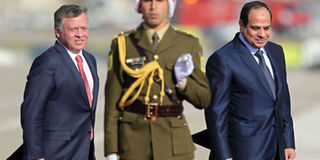Shh...: Be careful what you say in Egypt under al-Sisi

Jordan's King Abdullah II (L) and Egypt's President Abdel Fattah al-Sisi (R) review the honour guard upon their arrival at King Abdullah Airbase Marka in Amman on December 11, 2014. Egyptian President Abdel Fattah al-Sisi regime has been accused by activists of cracking down on dissent. PHOTO/ KHALIL MAZRAAWI/AFP.
What you need to know:
Not only are the once reviled police back on the streets in full force, but so is a band of loyal “citizen informants” ready to pounce on any critic.
Activists accuse Sisi of installing a regime even more authoritarian than that of veteran Hosni Mubarak, who quit in early 2011 amid protesters’ chants of “bread, democratic freedom and social justice”.
Activists say they now have to be more cautious to evade the witch hunt launched by the authorities and regime loyalists aimed at silencing any dissent.
CAIRO
Six months after Abdel Fattah al-Sisi became Egypt’s president after crushing his opponents, criticism of his regime is either whispered or left unspoken amid stifling curbs on freedom of expression.
A deadly crackdown on Islamist supporters of Sisi’s predecessor Mohamed Morsi, whom he ousted last year, has generated a climate of fear at train and bus stations, public squares and cafes, activists say.
Not only are the once reviled police back on the streets in full force, but so is a band of loyal “citizen informants” ready to pounce on any critic.
Activists accuse Sisi of installing a regime even more authoritarian than that of veteran Hosni Mubarak, who quit in early 2011 amid protesters’ chants of “bread, democratic freedom and social justice”.
Activists say they now have to be more cautious to evade the witch hunt launched by the authorities and regime loyalists aimed at silencing any dissent.
Their advice? Don’t air political views in public, secure your mobile phone and meet only at trusted places.
Leftist activist Abdel Rahman is still shaken by what he witnessed in September.
HEADING HOME
While heading home in a minibus, he heard a woman criticise Sisi and encourage another passenger to say what he thought.
As the bearded passenger began expressing a critical view, she called the police to arrest the man she denounced as “a terrorist member of the Muslim Brotherhood”, which the authorities last December designated a “terrorist” organisation.
“The man was pulled out of the bus, beaten and arrested,” Abdel Rahman said.
“Now I tell my friends not to talk politics when using public transport, or in the streets or cafes,” said Abdel Rahman who talked to AFP at the headquarters of a leftist youth movement.
What he saw was not a one-off.
On Saturday, two British Egyptians were detained briefly at a Cairo metro station after another passenger complained they said in English there could be violence on January 25, fourth anniversary of the anti-Mubarak revolt.
Karim Taha of the April 6 movement, a key anti-Mubarak youth group, said that even Morsi’s brief year in power was better than what was happening today.
“We were able to meet in public gardens” then, he said. “Now it’s just impossible.”
Ahmed, 27, was detained for nine days in January after he was overheard discussing politics on the phone with a friend.
“If someone in the street or subway asks about your political views, you’re afraid to say what you really think given the security crackdown,” said Ahmed.




